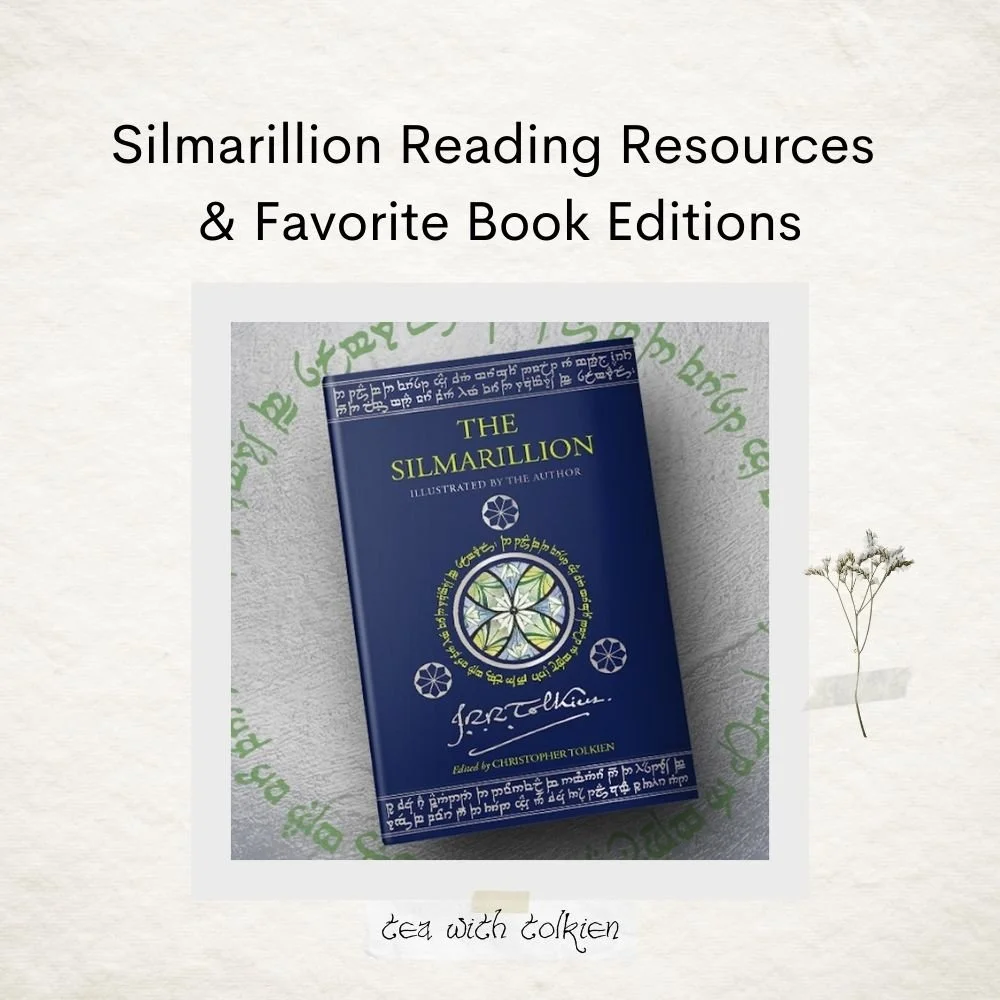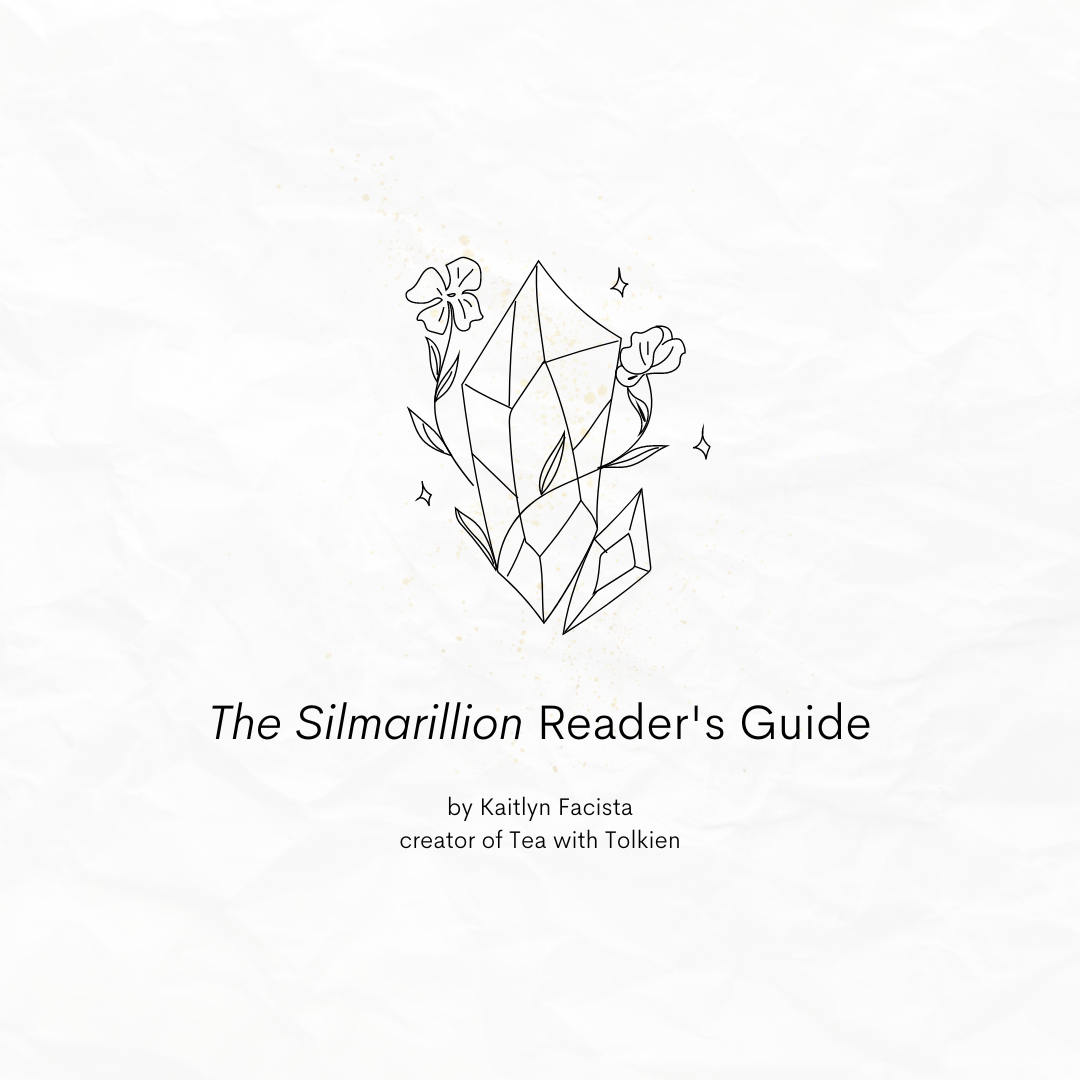Finwë was wed to Míriel, and their son Fëanor was born. However, after the birth of Fëanor, Míriel languished and was unable to continue living. She went to Lórien to rest, and her spirit departed from her body and went to the Halls of Mandos. Finwë was grieved at the loss of his wife. Fëanor grew swiftly and was the most subtle in mind and skilled in hand of the Noldor. Fëanor devised letters that bear his name (Fëanorian letters), and was the first who discovered how to make gems. Fëanor was married to Nerdanel.
All in The Silmarillion
Silmarillion Reading Resources & Favorite Editions of The Silmarillion
After it came up during our last discord chat, I wanted to share some recommended Silmarillion Reading Resources as well as favorite editions of The Silmarillion for those who were interested.
Silmarillion Summer: Introduction to The Silmarillion (Part One)
The Silmarillion is one of Tolkien’s most challenging works and yet also the most beautiful and important in my opinion. Many Tolkien fans new and old often feel intimidated by its depth and bewildered by its vocabulary, but it’s become my goal to encourage, equip, and inspire Tolkien fans to not only pick up The Silmarillion — but to finish it as well!
Introducing The Silmarillion Reader’s Guide: a Free Resource from Tea with Tolkien
The Silmarillion is one of Tolkien’s most challenging works and yet also the most beautiful and important in my opinion. Many Tolkien fans new and old often feel intimidated by its depth and bewildered by its vocabulary, but it’s become my goal to encourage, equip, and inspire Tolkien fans to not only pick up The Silmarillion — but to finish it as well!
Guide to The Silmarillion: Of the Rings of Power and the Third Age
"There at the last they looked upon death and defeat, and all their valour was in vain; for Sauron was too strong. Yet in that hour was put to the proof that which Mithrandir had spoken, and help came from the hands of the weak when the Wise faltered. For, as many songs have since sung, it was the Periannath, the Little People, dwellers in hillsides and meadows, that brought them deliverance."
Guide to The Silmarillion: Akallabêth: The Downfall of Númenor
“...Yet it seems that you desire now to have the good of both kindreds, to sail to Valinor when you will, and to return when you please to your homes. That cannot be. Nor can the Valar take away the gifts of Ilúvatar. The Eldar, you say, are unpunished, and even those who rebelled do not die. Yet that is to them neither reward nor punishment, but the fulfilment of their being. They cannot escape, and are bound to this world, never to leave it so long as it lasts, for its life is theirs. And you are punished for the rebellion of Men, you say, in which you had small part, and so it is that you die. But that was not at first appointed for a punishment. Thus you escape, and leave the world, and are not bound to it, in hope or in weariness. Which of us therefore should envy the others?” - JRR Tolkien
Guide to The Silmarillion: Of the Voyage of Eärendil and the War of Wrath (Ch. 24)
"Hail Eärendil, of mariners most renowned, the looked for that cometh at unawares, the longed for that cometh beyond hope! Hail Eärendil, bearer of light before the Sun and Moon! Splendour of the Children of Earth, star in the darkness, jewel in the sunset, radiant in the morning!"
Guide to The Silmarillion: Of Tuor and the Fall of Gondolin (Ch. 23)
"At last, in the year when Eärendil was seven years old, Morgoth was ready, and he loosed upon Gondolin his Balrogs, and his Orcs, and his wolves; and with them came dragons of the brood of Glaurung, and they were become now many and terrible." - Of Tuor and the Fall of Gondolin
Guide to The Silmarillion: Of The Ruin of Doriath (Ch. 22)
“Morgoth hath bewitched thee; for he that seeth through Morgoth’s eyes, willing or unwilling, seeth all things crooked. Long was Turin thy son fostered in the halls of Menegroth, and shown love and honour as the son of he King; and it was not by the King’s will nor by mine that he came never back to Doriath. And afterwards thy wife and thy daughter were harboured here with honour and goodwill; and we sought by all means that we might dissuade Morwen from the road to Nargothrond. With the voice of Morgoth thou dost now upbraid thy friends.”
Guide to The Silmarillion: Of Túrin Turambar (Ch. 21)
"Thereat Glaurung stirred for the last time ere he died, and he spoke with his last breath, saying: ‘Hail, Nienor, daughter of Húrin. We meet again ere the end. I give thee joy that thou hast found thy brother at last. And now thou shalt know him: a stabber in the dark, treacherous to foes, faithless to friends, and a curse unto his kin, Túrin son of Húrin! But the worst of all his deeds thou shalt feel in thyself.’ Then Glaurung died, and the veil of his malice was taken from her, and she remembered all the days of her life."
Guide to The Silmarillion: Of the Fifth Battle: Nirnaeth Arnoediad (Ch. 20)
"Great was the triumph of Morgoth, and his design was accomplished in a manner after his own heart; for Men took the lives of Men, and betrayed the Eldar, and fear and hatred were aroused among those that should have been united against him. From that day the hearts of the Elves were estranged from Men, save only those of the Three Houses of the Edain." - The Silmarillion
Guide to The Silmarillion: Of Beren and Lúthien (Ch. 19)
“Among the tales of sorrow and of ruin that come down to use from the darkness of those days there are yet some in which amid weeping there is joy and under the shadow of death light that endures. And of these histories most fair still in the ears of the Elves is the tale of Beren and Lúthien."












